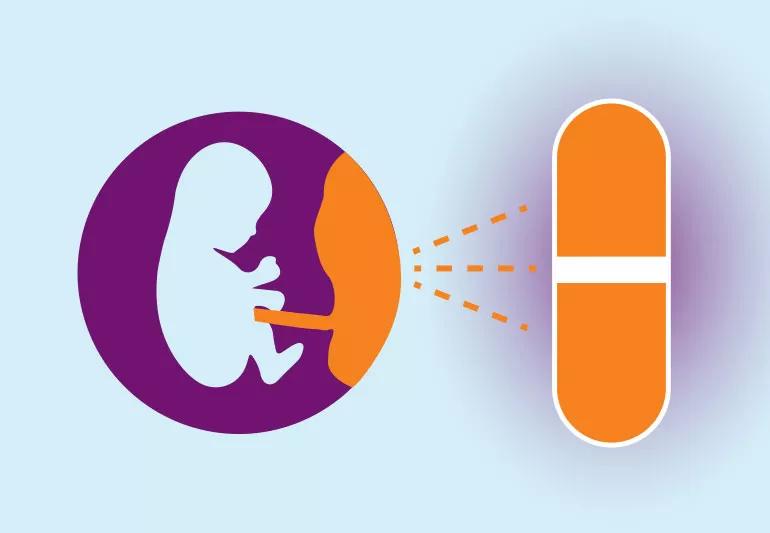Some women swear by them, but scientific studies are lacking

Image content: This image is available to view online.
View image online (https://assets.clevelandclinic.org/transform/ead7c2dc-9115-41b8-bccb-c34d544b26d2/placentaPill-511322642-770x553-1_jpg)
Illustration depicting a placenta before and after, transforming into a pill
A growing desire of many soon-to-be-parents to have “natural” pregnancy and childbirth experiences has brought practices like water labor and working with a doula closer to the mainstream.
Advertisement
Cleveland Clinic is a non-profit academic medical center. Advertising on our site helps support our mission. We do not endorse non-Cleveland Clinic products or services. Policy
It’s also introduced many a new mom to the odd-sounding concept of eating their placenta.
Wait — their placenta? Yes, you read that right.
Many celebrity moms and social media influencers have very publicly gushed about how and why they’ve consumed their own placentas postpartum, in the form of pills, smoothies or something else. The belief seems to be that doing so can help a woman’s body rebound after childbirth.
But health experts say, not so fast.
“Obstetrics and gynecology research has shown no concrete or documented benefits to women,” says Oluwatosin Goje, MD, an Ob/Gyn who specializes in infectious disease. “In fact, some people feel that it’s actually harmful to consume the placenta because it comes with a risk of spreading infection.”
In case you need a refresher, the placenta is an organ that forms in a woman’s uterus after conception. Its duties include delivering oxygen, nutrients and hormones to the growing baby inside while filtering out toxins and waste.
It’s sometimes referred to as the “afterbirth” because women push it out vaginally after giving birth. (In the case of a C-section, the doctor takes it out during the procedure.)
So why would someone want to consume the thing? Dr. Goje explains that some new mothers believe the placenta can provide a natural source of hormones and nutrients that can help ease their pain, increase their breast milk production and make them less likely to develop postpartum depression.
Advertisement
“I think the idea is that if this placenta has been nourishing the fetus in utero, maybe it could have some benefit to the mother,” she says.
This idea isn’t as far-fetched as it might seem. Placenta consumption actually has an official name — placentophagy — and many kinds of mammals do it. But we don’t know exactly why they do it. Some people claim it’s to reap these supposed health benefits, while others say it’s just an instinctive behavior to eliminate evidence that would let a predator know an animal has just given birth.
Regardless of why other animals eat their placenta, at this point, studies do not support claims that doing so provides any significant health benefits to human women, Dr. Goje says.
“Studies in rats have shown possible benefits, but most of the studies involving humans are poorly done or biased because they use self-reported surveys,” she says.
What’s most concerning to Dr. Goje and other health professionals, though, is the risk of infection that comes with consuming placenta that isn’t properly prepared.
There are a number of companies that will, for a cost, dehydrate a woman’s afterbirth and process it into pills that she takes like a supplement over the course of a few weeks.
The red flag here, Dr. Goje explains, is that this process isn’t regulated by the Food and Drug Administration. And if there aren’t regulations around how the placenta should be processed, there’s no guarantee that it’s being heated at the appropriate temperature and length of time needed to destroy any infectious bacteria and viruses it might contain.
“Inadequate handling and preparation of this placenta may not eradicate pathogens,” she notes. Those pathogens pose a risk not only to moms but to breastfeeding babies.
A case study published by The Centers for Disease Control and Prevention in 2016 described how one infant was hospitalized for late-onset group B strep infection — a potentially serious infection in newborns — that was linked to bacteria found in the mother’s placenta pills.
Dr. Goje notes that blending raw placenta into a smoothie or cooking it into a meal doesn’t eliminate this concern either.
“How do you know that you’ve eradicated any infection?” she reiterates.
If you’re an expectant mom who plans to eat your placenta, Dr. Goje recommending talking with your healthcare provider about the potential risks.
“For people who might be doing this, they have to be aware that they can infect themselves or their baby,” she says.
Advertisement

Sign up for our Health Essentials emails for expert guidance on nutrition, fitness, sleep, skin care and more.
Learn more about our editorial process.
Advertisement
Bleeding is a risk and warrants taking care, but the reward of this lifesaving medication is great
Severe and debilitating headaches can affect the quality of your child’s life
With repeat injections over time, you may be able to slow the development of new wrinkles
Although it can be alarming, it’s normal to experience blood clots during menstruation
Stretch before heading outside, keep proper form and avoid jerking or twisting to throw snow
Type 2 diabetes isn’t inevitable with these dietary changes
Applying a hot or cold compress can help with pain
Pump up your iron intake with foods like tuna, tofu and turkey